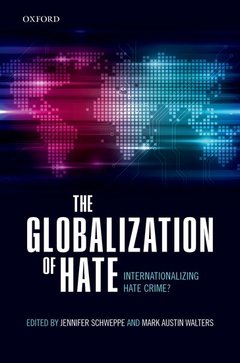Description
The Globalization of Hate
Internationalizing Hate Crime?
Coordinators: Schweppe Jennifer, Austin Walters Mark
Language: English
Publication date: 05-2016
352 p. · 16.9x24 cm · Hardback
352 p. · 16.9x24 cm · Hardback
Description
/li>Biography
/li>
The Globalization of Hate: Internationalizing Hate Crime? is the first book to examine the impact of globalization on our understanding of hate speech and hate crime. Bringing together internationally acclaimed scholars with researchers, policy makers and practitioners from across the world, it critically scrutinises the concept of hate crime as a global phenomenon, seeking to examine whether hate crime can, or should, be conceptualised within an international framework and, if so, how this might be achieved. Beginning with the global dynamics of hate, the contributions analyse whether hate crime can be defined globally, whether universal principles can be applied to the phenomenon, how hatred is spread, and how it impacts upon our global society. The middle portion of the book moves beyond the broader questions of globalisation to jurisdictional examples of how globalization impacts upon our understanding of, and also our responses to, hate crime. The chapters explore in greater detail what is happening around the world and how the international concepts of hate crime are being operationalised locally, drawing out the themes of globalization and internationalization that are relevant to hate crime, as evidenced by a number of jurisdictions from Europe, the US, Asia, and Africa. The final part of the book concludes with an examination of the different ways in which hate speech and hate crime is being combatted globally. International law, internet regulation and the use of restorative practices are evaluated as methods of addressing hate-based conflict, with the discussions drawn from existing frameworks as well as exploring normative standards for future international efforts. Taken together, these innovative and insightful contributions offer a timely investigation into the effects of hate crime, offering an interdisciplinary approach to tackling what is now a global issue. It will be of interest to scholars and students of criminology, sociology and criminal justice, as well as criminal justice practitioners, police officers and policy makers.
Jennifer Schweppe is a lecturer in law at the University of Limerick. She is co-founder and co-director of the International Network for Hate Studies. She is also co-founder and co-Director of the University of Limerick based Hate and Hostility Research Group, the only academic research group in Ireland dedicated to exploring and understanding hate crime in an Irish context. She has published widely in the area of hate crime, and her work explores the experience, understanding and potential future reform of hate crime in an Irish context. Her work in the area of hate crime has been funded by the Irish Research Council (Monitoring Hate Crime: Analysis and Development of Online Third Party Reporting), the Irish Council for Civil Liberties (Out of the Shadows: 360? Evaluation of Hate Crime in Ireland) and the European Union (The Life Cycle of a Hate Crime: Best practice in the prevention and prosecution of Hate Crime). Mark Walters is a Reader in Criminal Law and Criminal Justice at the University of Sussex. He is also the co-founder and co-director of the International Network for Hate Studies. He has published widely in the field of hate crime, focusing in particular on the criminalisation of hate-motivated offences, criminological theories of causation, and the use of restorative justice for hate crime. His monograph Hate Crime and Restorative Justice: Exploring Causes, Repairing Harms was published by Oxford University Press in 2014. He is currently involved in a number of empirical studies on hate crime including: The indirect experience of hate crime: the victim group response (funded by The Leverhulme Trust); The Life Cycle of a Hate Crime: Best practice in the prevention and prosecution of Hate Crime (funded by the EU); and Policing Hate Crime: modernising the craft, an evidence-based approach (funded by HEFCE/College of Policing).
© 2024 LAVOISIER S.A.S.




